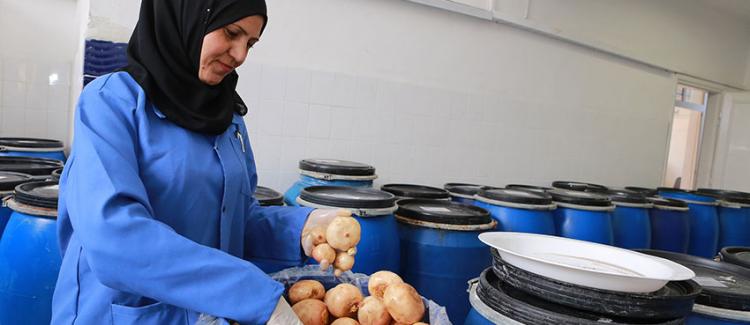Development Challenge
Despite showing steady growth over the past few years and contributing a total of JOD 50 million to the national economy directly and indirectly, home-based businesses (HBB) still face major organizational problems and suffer from a number of gaps and inefficiencies that hinder their growth.
With the exception of the Greater Amman Municipality (GAM), home-based businesses are still unable to obtain a license in Jordan. This prevents them from trading with other businesses and diversifying their markets, which limits their end market to family and friends, and causes them to operate informally and remain in the same income bracket.
Home-based businesses in Jordan also lack access to finance and loans, and they consider business registration and licensing fees to be high. As for management and marketing, HBB owners usually rely heavily on word of mouth to promote their product(s). They do not have the capabilities or resources to market on a professional level.
USAID LENS Work
Following broad research and market segmentation, and after holding multiple focus groups and stakeholder meetings with home-based businesses, government entities and concerned institutions, USAID LENS determined that the group of HBB owners who are considered a key area of growth are women working in food production from their homes.
Research has shown that the majority of women owners are between 30-50 years of age and have the willingness to grow. In most cases, the owners’ home-based business is their only source of income and food production is their only skill. USAID LENS is working to support this sector and facilitate its growth and expansion in all governorates.
For a quick summary of this sector, check out our fact sheet on home-based businesses in Jordan.
Main Achievements
-
In November 2015, USAID LENS held an orientation workshop for 50 women home-based food processors based in Zarqa governorate on the registration and licensing of home-based businesses. The workshop included speakers from relevant institutions including Zarqa municipality, Jordan Food and Drug Administration, Jordan Standards and Metrology Organization and IRADA Enhanced Productivity Centers.
-
In late 2016, USAID LENS continued to support policy work that would allow HBBs to license their business outside of GAM. Accordingly, an amendment to the Zoning bylaw was published in the Official Gazette n°5818 in November 2016 which allows HBBs outside of GAM to license their businesses - as of January 1, 2016 - in 3 categories: food processing, intellectual crafts, and handicrafts.
-
In October 2016, USAID LENS held the HBBs Show Case Event. This event showcased USAID LENS work with home-based businesses at the factory of one of its grant beneficiaries Heba Qandeel (who started out as a home-based business herself and LENS provided her with a production line to introduce new flavors to her product/vinegars, as well as technical support). The US Ambassador Alice Wells attended the event along with the Governor of Zarqa Dr. Ra’ed Al Adwan. 20 women-owned HBBs based in Zarqa were given the chance to display and sell their food products to USAID seniors delegates, as well as representatives from big businesses (hotels and restaurants).
-
The project has also signed five grants to give technical assistance to 175 HBBs in Amman, Irbid Tafilah and Aqaba with total award value of JOD 125,618 , as well as one PO award for 50 HBB in Zarqa with total award value of JOD 51,699. These awards will upgrade HBB skills in food safety standards, product development, artisanal production, packaging, and transportation solutions in order to link them with larger markets and be able to meet the demand set by those markets and as a result grow their business and increase their income.
-
Through USAID LENS, 19 HBBs were linked with Khodarji online market channel. Khodarji will provide the HBBs with packaging as well as a sales channel to sell their products online in west Amman and reach more, new customers at a different price point than they are used to.
-
25 HBBs participated in the Marriott Hotel Christmas Market event where they had the opportunity to implement the skills they learned in various trainings they have taken through USAID LENS and test their upgraded products in the market. This included artisanal production of labaneh, pickles, and new desserts.
-
18 HBBs were linked with new end markets in west Amman directly, this includes partnerships with Jordan SME’s Association, Sandwich Boutique, and Mijana restaurant. Other linkages are currently underway with Mushakkal, Romero Group, Moka Café, Hyatt Hotel, and Marriott Hotel.
-
The HBB team at USAID LENS continued its interventions and partnerships to support home-based businesses working in food processing. Business Service Providers under the HBBs RFA such as Princess Basma in Aqaba and Qweira, Competence in Karak and Al Etizan in Ghour Al Karak/Safi continued in 2018 conducting trainings which included theoretical and practical training session. Training Package is complete, consisting of (18) different empowerment topics.
-
In April 2018, USAID LENS held an event at the Royal Academy of Culinary Arts, that showcased food products from 25 home-based businesses (HBBs) it has worked with from Zarqa, Aqaba, Irbid, Ghor, Amman and Karak. LENS brought together restaurants to taste their products in an effort to establish new relationships between HBBs and restaurants as we work towards Jordan Food Week. Numerous restaurants expressed their interest in working with these HBBs, for the quality of their product, and were excited about participating in the event, and in Jordan Food Week.




